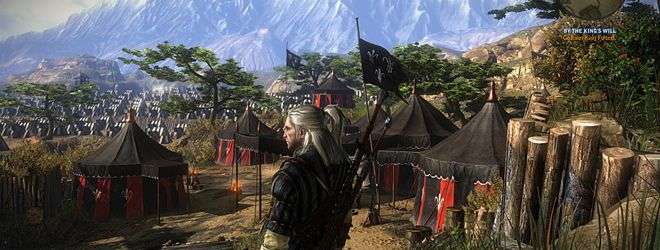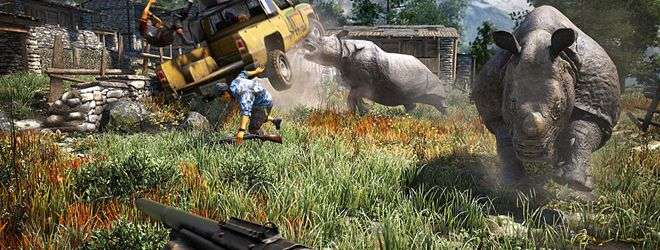The ‘Corrupting Our Direction’ Zone
by Chris
 It feels strange to be writing an article to complain about having too much content in a game, given that many game reviews over the last couple of decades have complained about the very opposite. I can’t think of one critic that has ever said ‘there is too much to do, the game is rammed with content, it just isn’t right’. It seems massively counter-productive to complain about such a thing – a developer has tried to ensure the consumer gets the biggest bang for their buck and yet… I feel like the consumer is being nothing short of bamboozled with flashy icons and mini-maps overflowing with icons. Let’s go back a few beats, shall we?
It feels strange to be writing an article to complain about having too much content in a game, given that many game reviews over the last couple of decades have complained about the very opposite. I can’t think of one critic that has ever said ‘there is too much to do, the game is rammed with content, it just isn’t right’. It seems massively counter-productive to complain about such a thing – a developer has tried to ensure the consumer gets the biggest bang for their buck and yet… I feel like the consumer is being nothing short of bamboozled with flashy icons and mini-maps overflowing with icons. Let’s go back a few beats, shall we?
Open-world games are some of the most time consuming to both develop and play. You can set out traveling in one direction, with a specific task in mind (or not as the case may be), and before you’ve completed your objective you’ve picked up three new side quests, two new companions and a ‘mysterious note’ hinting at a ‘suspicious death’ on the other side of the map. These sorts of happenings are awesome mainly because they really drive home the very idea of what the developer is trying to achieve – that we’re in a living, breathing world that lives with or without us. Capturing that essence is something long strived for by a good portion of developers and the Fallout, Grand Theft Auto, Elder Scrolls and The Witcher series have nailed this time and time again. This content is also good because it appears to be naturally occurring, like the player has literally stumbled into the path of a story that was going to continue with or without their participation.
The aforementioned games also tend to include plenty of content, both for your main story, side missions and optional side bits, regardless of how they’re set up to be experienced. So in the case of The Witcher and Grand Theft Auto, you play specific characters, existing in a world where the main story (and a lot of your side missions) know who you are and what the score is with you as a protagonist. Elder Scrolls and Fallout tend to include more content than the other two, but namely because you start with a blank slate upon which you craft your character. Although this doesn’t mean you can abandon all reason and break the game, it does mean you’re given considerable scope within the sandbox to do what you want as you.
 Now, up until recently all these open-world and sandbox games have been some of the best in the business, not just for the reasons I’ve mentioned, but for a variety of different things they have achieved, which has won them awards and praise. However, I’ve noticed an increasing number of games starting to exceed what I’ve come to expect in terms of game content (which is great) but at the cost of quality of the overall content (which is the opposite of great).
Now, up until recently all these open-world and sandbox games have been some of the best in the business, not just for the reasons I’ve mentioned, but for a variety of different things they have achieved, which has won them awards and praise. However, I’ve noticed an increasing number of games starting to exceed what I’ve come to expect in terms of game content (which is great) but at the cost of quality of the overall content (which is the opposite of great).
Lets start with Far Cry 3, a game which received decent amounts of praise, and which, at the time of writing, sits on a Metacritic score (PC) of eighty eight, based on forty three reviews. This is a pretty decent score by all accounts, and having sunk around thirty hours into Far Cry 3 I can confirm it is a good game, bursting full of content and fun to be had. That being said, it gets very easy, very quickly, the side missions are complete rubbish and, apart from an insane number of fetch quests (which amount to ‘go to this spot’ locations on the mini-map), there isn’t a whole lot to do. The most fun comes from hunting animals, but this is capped quickly and there isn’t any other reason to hunt after you’ve got the upgrades. All this content could and should amount to hours of gameplay but it’s so very bland and boring, providing you with nothing more than a time sink. Although the game garnered high praise, there were criticisms of the main story and its characters, the protagonist in particular being a whiny, irritating rich-boy douche bag – you can relate to Jason Brody in the same way you can relate to an overpriced melon that a toddler has drawn on.
Despite the horrendous side quests and fluff content, Far Cry 3 went on to sell over ten million copies and spawn a sequel, Far Cry 4, which has also been highly praised but which also replicates many of the pros and cons discussed above. The reason for this? Well you don’t shift ten million copies of your game if people don’t like it, aye?
Let’s continue with the opinion-splitting: Watch_Dogs, a game I enjoyed but which others found hard to enjoy. Currently it holds a Metacritic score (PC) of seventy seven, based on eighteen reviews. So, less than Far Cry 3 both in score and the number of people that actually reviewed it. Seventy seven is by no means a bad score on Metacritic and I personally sunk fifty hours into the title myself and enjoyed (almost) every minute of it. I can certainly praise the gameplay throughout, the side missions were varied and fun and there was plenty to do. Again though, although there was loads to do, by Christ was some of it really, really laboured. The side quests were much, much better than Far Cry 3, without a shadow of a doubt, but there was so much ‘filler’ material hanging onto the coat tails of the game.
 The mini-map was one of the most cluttered and pointless features, because I couldn’t see where I was going half the time. It’s like the game was forcing content upon me at every given opportunity, like some sort of paranoid parent figure, concerned that I wasn’t having fun, in the right way. Going between points, scanning different things to unlock one extra mission – if the driving and police chases hadn’t been so much fun, I probably would have fast travelled everywhere just to get it done. Instead, I gave up – I stopped playing because I couldn’t be bothered to go through some arbitrary gameplay feature (in this instance, scanning QR codes) just to unlock one piece of content. I just wanted to play the game, not spend a couple of hours unlocking the ability to play the game.
The mini-map was one of the most cluttered and pointless features, because I couldn’t see where I was going half the time. It’s like the game was forcing content upon me at every given opportunity, like some sort of paranoid parent figure, concerned that I wasn’t having fun, in the right way. Going between points, scanning different things to unlock one extra mission – if the driving and police chases hadn’t been so much fun, I probably would have fast travelled everywhere just to get it done. Instead, I gave up – I stopped playing because I couldn’t be bothered to go through some arbitrary gameplay feature (in this instance, scanning QR codes) just to unlock one piece of content. I just wanted to play the game, not spend a couple of hours unlocking the ability to play the game.
You could chalk this up to bad luck but again Watch_Dogs suffers from some of the same problems that Far Cry 3 did: poor protagonist, suspect supporting cast, lacklustre story. You can explain some of this away with the ridiculous hype surrounding Watch_Dogs but, equally, it seems like Ubisoft, much like with Far Cry 3, opted to stuff their game full of poorly thought out content to ‘give the player something to do’ rather than focus on the main story and its characters. I wouldn’t be concerned, except Watch_Dogs also shifted ten million units, four million alone in the first week, and a sequel has all but been confirmed by Ubisoft after stating the game is ‘now a franchise’ and the sales ‘prove it has the staying power’. Yeah, the staying power to bore my tits clean off with so much filler content you could make Yves Guillemot airtight.
I say all this and yet, what am I asking for, really? Was I not entertained? Did I not get my money’s worth? What’s actually the problem here? I’m not on a soap box complaining for the sake of it – I’ve already told you I enjoyed both games; I got roughly eighty hours from both of them combined. The games sold well, so they have or will spawn sequels, ensuring I get entertained some more and, generally, everyone’s a winner, right? This is what we and I want – success for good games. I fully accept that not every game is going re-write the rule book on side quests and extra content just as much as every story and character isn’t going to impress everyone. Despite this though, there is a concern – a lingering issue.
It has been proven in the past that with the right formula this industry can print money like no other. While innovation and pushing the boundaries of what we know videogames can achieve is very important, there is nothing more important nor more insatiable to a businessman or woman than the ability to make money because, like it or not, Ubisoft is a business. They want to make great games but they want to make stacks of money, too. At some point, these two viewpoints may clash because not every great game makes lots of money. If a choice is to be made for a company as big as Ubisoft between raising the bar of games as we know it against the possibility of high sales, I know where I’d be placing my money. This is where we risk entering what I like to call the ‘Corrupting our Direction’ zone or COD Zone if you will – essentially finding a formula that works, regardless of quality, just so long as it prints money for everyone to get rich. If we enter that zone, it isn’t a good thing for the developers or the game. The developers get trapped, never deviating from a formula, and the game stagnates and becomes meaningless.
Far Cry 3 and Watch_Dogs were both very good games but they could have been amazing games and my fear is not that Ubisoft will repeat their formula again – my fear is that someone else will. After all, I don’t remember having yearly Battlefield titles until Call of Duty started making the mega bucks. Do you?
Last five articles by Chris






















Thought this piece was nothing short of brilliant.
Also, it’s good to know I’m not the only person who thinks something must be wrong with them when they don’t like games as much as they should because there’s way too much to do in them.